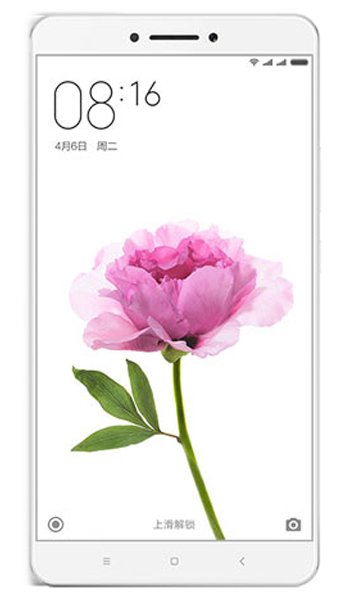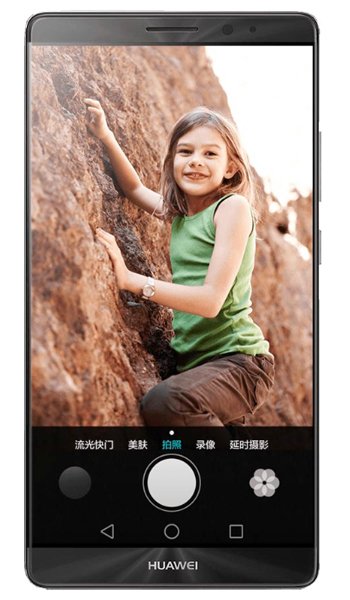Xiaomi Mi Max vs Huawei Mate 8 Comparison and Differences
Smartphone 1

Xiaomi Mi Max
Smartphone 2

Huawei Mate 8
Smartphone 3
Xiaomi Mi Max or Huawei Mate 8 Specs Comparison
or
 Common specs
Common specs
| Brand and model | Xiaomi Mi Max | Huawei Mate 8 | |
| Rating | (+) | (+) | |
| Release date | 2016, May | 2015, November | |
| Dimensions (HxWxD) | 173.1 x 88.3 x 7.5 mm | 6.81 x 6.81 x 3.48 in | 157.1 x 80.6 x 7.9 mm | 6.19 x 6.19 x 3.17 in | |
| Weight | 203 g | 7.16 oz | 185 g | 6.53 oz | |
| Body Build | Front glass, aluminum body | Front glass, aluminum body | |
| Case | buy from Amazon | buy from Amazon | |
| Colors | Gray, Silver, Gold | Champagne Gold, Moonlight Silver, Space Gray, Mocha Brown | |
| Battery | 4850 mAh, Non-removable Li-Ion | 4000 mAh, Non-removable Li-Po | |
| Battery life |
Stand by time - Up to 528 h (3G) Music play - Up to 98 h |
||
| Approximate price | 150 EUR | 300 EUR | |
| Check price | from Amazon | from Amazon |
 Screen
Screen
| Technology | IPS LCD | IPS-NEO LCD | |
| Touchscreen | capacitive touchscreen | capacitive touchscreen | |
| Display colors | 16M | 16M | |
| Screen size | 6.44" in | 6" in | |
| Screen area | 114.3 cm2 | 98.7 cm2 | |
| Screen format | 16:9 (height:width) | 16:9 (height:width) | |
| Screen to body ratio | 74.8% | 78.0% | |
| Screen resolution | 1080 x 1920 px | 1080 x 1920 px | |
| Screen PPI /points per inch/ | 342 PPI | 368 PPI | |
| Screen protection | Corning Gorilla Glass 4 | Corning Gorilla Glass 3 | |
| Screen protector | buy from Amazon | buy from Amazon |
 Camera and Video
Camera and Video
| Rear camera, main | 16 MP, Single | 16 MP, Single | |
| Camera specs | -16 MP, PDAF, f/2.0 | -16 MP, f/2.0, 27mm (wide), 1/2.8'', OIS, PDAF | |
| Functions | Dual-LED dual-tone flash, panorama, HDR | Dual-LED dual-tone flash, panorama, HDR | |
| Video | 2160p@30fps, 1080p@30fps, 720p@120fps | 1080p@60fps, 1080p@30fps, 720p@120fps | |
| Front camera, selfie | 5 MP, Single | 8 MP, Single | |
| Specifications | 5 MP, f/2.0 | 8 MP, f/2.4, 26mm (wide) | |
| Video | 1080p@30fps | 1080p@30fps |
 Performance
Performance
| Operating system - OS | Android 6.0 (Marshmallow), upgradable to 7.0 (Nougat); MIUI 10 | Android 6.0 (Marshmallow), upgradable to 7.0 (Nougat); EMUI 4 | |
| Chipset | - Qualcomm MSM8956 Snapdragon 650 - Qualcomm MSM8976 Snapdragon 652 (28 nm) - Prime model |
- HiSilicon Kirin 950 (16 nm) | |
| CPU | - Hexa-core (4x1.4 GHz Cortex-A53 & 2x1.8 GHz Cortex-A72) -Octa-core (4x1.4 GHz Cortex-A53 & 4x1.8 GHz Cortex-A72) |
- Octa-core (4x2.3 GHz Cortex-A72 & 4x1.8 GHz Cortex A53) | |
| GPU | Adreno 510 | Mali-T880 MP4 | |
| External memory | microSD, up to 256 GB (uses SIM 1 slot) | microSD, up to 256 GB (uses SIM 2 slot) | |
| Internal memory | 16 GB, 2 GB RAM; 32/64 GB, 3 GB RAM 128 GB, 4 GB RAM - Prime model |
32 GB, 3 GB RAM - NXT-L09, NXT-L29 64 GB, 4 GB RAM - NXT-L29 |
 Benchmark
Benchmark
| Antutu 7 Total | |||
| GeekBench 6 Single Core | 259 | 363 | |
| GeekBench 6 Multi Core | 588 | 1131 | |
| GeekBench 5 Single Core | 261 | 339 | |
| GeekBench 5 Multi-Core | 770 | 1273 | |
| GeekBench 4 Single Core | 1376 | 1683 | |
| GeekBench 4 Multi-Core | 3146 | 5282 | |
| GeekBench 4 RenderScript | 3679 | 3812 | |
| GeekBench 4 Battery | 2489 |
 Communication and Connectivity
Communication and Connectivity
| SIM card | Hybrid Dual SIM (Nano-SIM/ Micro-SIM, dual stand-by) | Nano-SIM - NXT-L09Hybrid Dual SIM (Nano-SIM, dual stand-by) - NXT-L29 | |
| Network | GSM / CDMA / HSPA / EVDO / LTE | GSM / HSPA / LTE | |
| Bands | -2G - GSM 850 / 900 / 1800 / 1900 - SIM 1 & SIM 2 CDMA 800 / 1900 -3G - HSDPA 850 / 900 / 1900 / 2100 CDMA2000 1xEV-DO TD-SCDMA -4G - LTE band 1(2100), 3(1800), 7(2600), 38(2600), 39(1900), 40(2300), 41(2500) |
-2G - GSM 850 / 900 / 1800 / 1900 - SIM 1 & SIM 2 (optional) -3G - HSDPA 800 / 850 / 900 / 1700(AWS) / 1900 / 2100 - NXT-L29, NXT-L09 -4G - LTE band 1(2100), 2(1900), 3(1800), 4(1700/2100), 5(850), 6(900), 7(2600), 8(900), 12(700), 17(700), 18(800), 19(800), 20(800), 26(850), 38(2600), 39(1900), 40(2300) - NXT-L29 LTE band 1(2100), 2(1900), 3(1800), 4(1700/2100), 5(850), 6(900), 7(2600), 8(900), 12(700), 17(700), 18(800), 19(800), 20(800), 26(850), 28(700), 38(2600), 39(1900), 40(2300) - NXT-L09 |
|
| Speed | HSPA, LTE | HSPA 42.2/5.76 Mbps, LTE-A (2CA) Cat6 300/50 Mbps | |
| GPRS | Yes | Yes | |
| Edge | Yes | Yes | |
| Wi-Fi | Wi-Fi 802.11 a/b/g/n/ac, dual-band, Wi-Fi Direct, DLNA, hotspot | Wi-Fi 802.11 a/b/g/n/ac, dual-band, DLNA, WiFi Direct, hotspot | |
| GPS | Yes, with A-GPS, GLONASS, BDS | Yes, with A-GPS, GLONASS, BDS | |
| NFC | Yes | ||
| USB | microUSB 2.0, USB Host | microUSB 2.0, USB Host | |
| Bluetooth | 4.2, A2DP, LE | 4.2, A2DP, EDR, LE | |
| Harmful irradiation | SAR - 0.84 W/kg (head) 0.63 W/kg (body) |
SAR - 1.49 W/kg (head) 0.32 W/kg (body) SAR EU - 1.46 W/kg (head) 0.21 W/kg (body) |
 Music and Audio
Music and Audio
| Radio | FM radio, recording | FM radio | |
| Headphone jack | Yes | Yes | |
| Others | - Active noise cancellation with dedicated mic | - 24-bit/192kHz audio -Active noise cancellation with dedicated mic |
 Other features
Other features
| Sensors | - Fingerprint (rear-mounted), accelerometer, gyro, proximity, compass , Infrared port | - Fingerprint (rear-mounted), accelerometer, gyro, proximity, barometer, compass | |
| Other extras |
- Fast battery charging: 37% in 30 min |
||
| Versions |
- Versions: Global; Standard; Prime |
- Also known as Huawei Ascend Mate8 |
Reviews and Opinions on Xiaomi Mi Max and Huawei Mate 8
If you had to recommend one of these phones to a friend, which one would it be and why? Share your arguments using the Add Opinion button!

